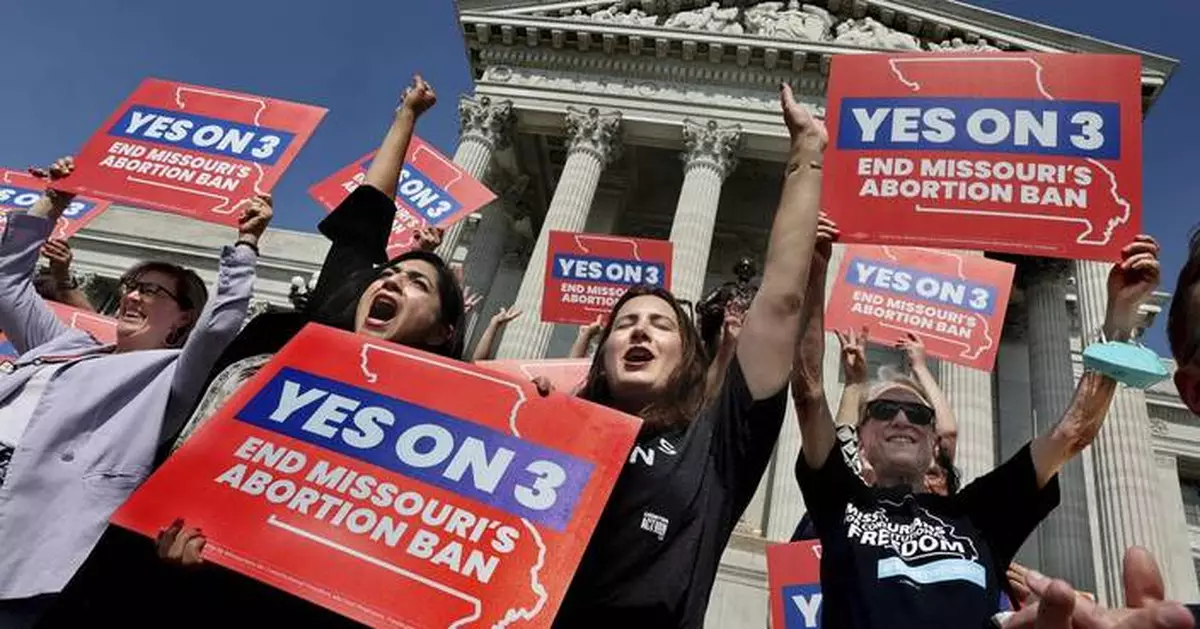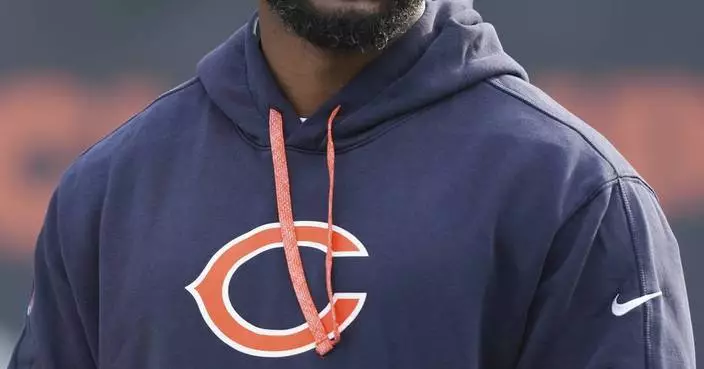COLUMBIA, Mo. (AP) — Missouri's Republican attorney general has pledged to enforce some laws restricting abortion despite a new constitutional amendment widely expected to undo the state's near-total ban on the procedure.
In an opinion requested by incoming GOP governor Mike Kehoe, Attorney General Andrew Bailey wrote that his office will continue enforcing a ban on abortion after fetal viability.
There is an exception carved out in the amendment for cases in which a health care provider deems an abortion necessary to “protect the life or physical or mental health of the pregnant person.”
“Under the express terms of the amendment, the government may still protect innocent life after viability,” Bailey wrote. “The statutes thus remain generally enforceable after viability.”
Bailey said his office also will continue to honor a Missouri law requiring parental permission for minors to receive abortions.
Bailey's opinion comes after voters approved a ballot measure this month that enshrines abortion rights in the state constitution while allowing lawmakers to restrict or ban it after fetal viability.
The term “viability” is used by health care providers to describe whether a pregnancy is expected to continue developing normally or whether a fetus might survive outside the uterus. Though there’s no defined time frame, doctors say it is sometime after the 21st week of pregnancy.
The measure’s passage was one of seven victories for abortion rights advocates this past election, while Florida, Nebraska and South Dakota defeated similar constitutional amendments, leaving bans in place.
Abortion rights amendments also passed in Arizona, Colorado, Maryland and Montana. Nevada voters also approved an amendment, but they’ll need to pass it again it 2026 for it to take effect. Another that bans discrimination on the basis of “pregnancy outcomes” prevailed in New York.
The Missouri amendment, which is to take effect Dec. 5, does not specifically override any state laws. Instead the measure leaves it to advocates to ask courts to knock down bans that they believe would now be unconstitutional.
Planned Parenthood affiliates that operate in Missouri sued the day after the election to invalidate the state’s abortion ban and several laws that regulate the care. That lawsuit is still pending.
Allowing restrictions on abortions after viability was a sticking point for some abortion rights supporters in Missouri.
Advocates had worried that failing to include such limits would sink their chances of passing abortion protections. But others cautioned against giving the Republican-controlled Legislature the power to enact regulations that could effectively end access.
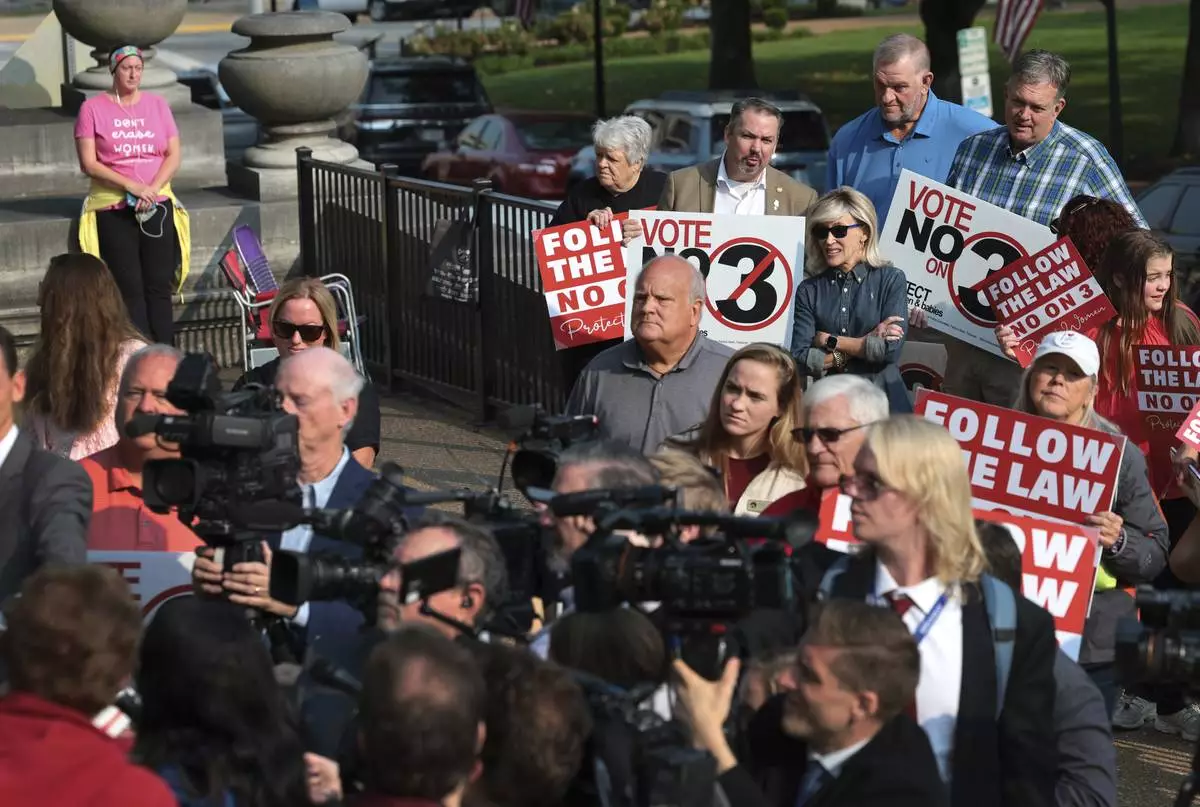
FILE - Abortion opponents watch and pray as members of the media interview attorney Mary Catherine Martin of the conservative Thomas More Society, after Missouri's Supreme Court heard arguments over whether an abortion-rights amendment should go before voters this year on Sept. 10, 2024 in Jefferson City, Mo. (Robert Cohen/St. Louis Post-Dispatch via AP, File)/St. Louis Post-Dispatch via AP)
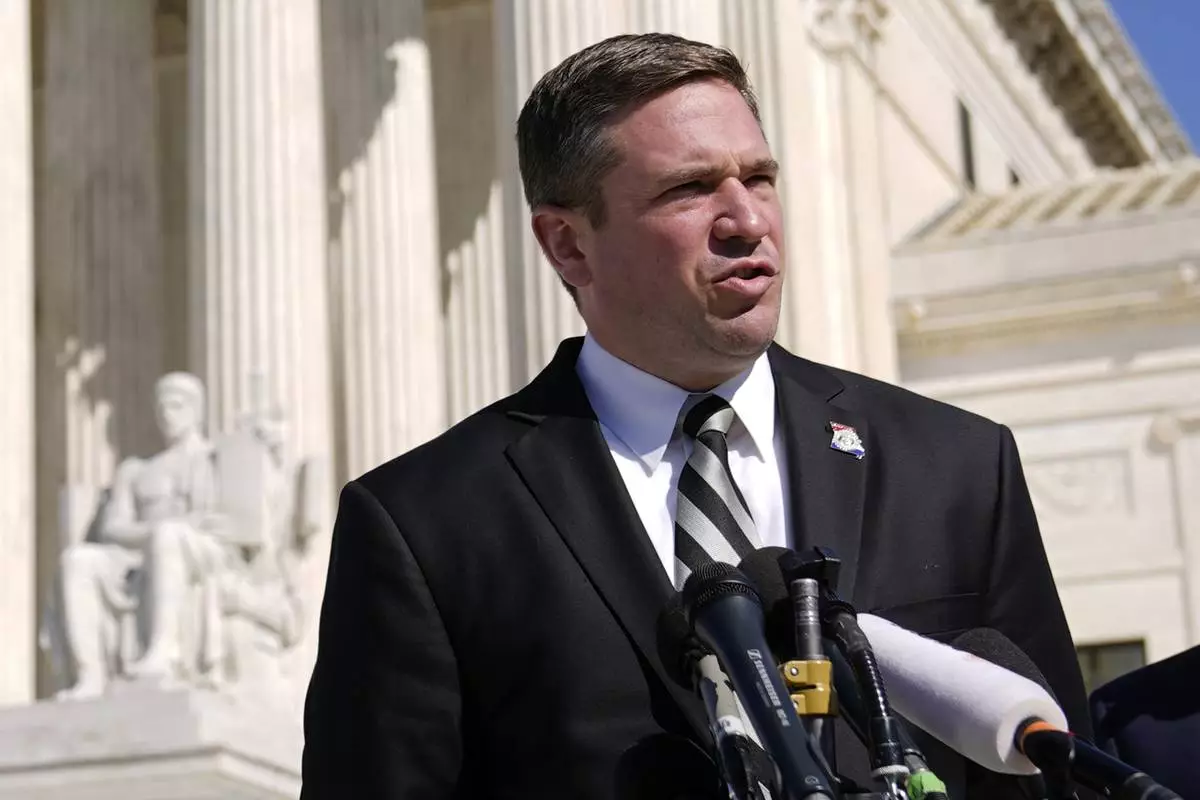
FILE - Missouri Attorney General Andrew Bailey speaks with reporters outside the U.S. Supreme Court, Feb. 28, 2023, on Capitol Hill in Washington. (AP Photo/Patrick Semansky, File)
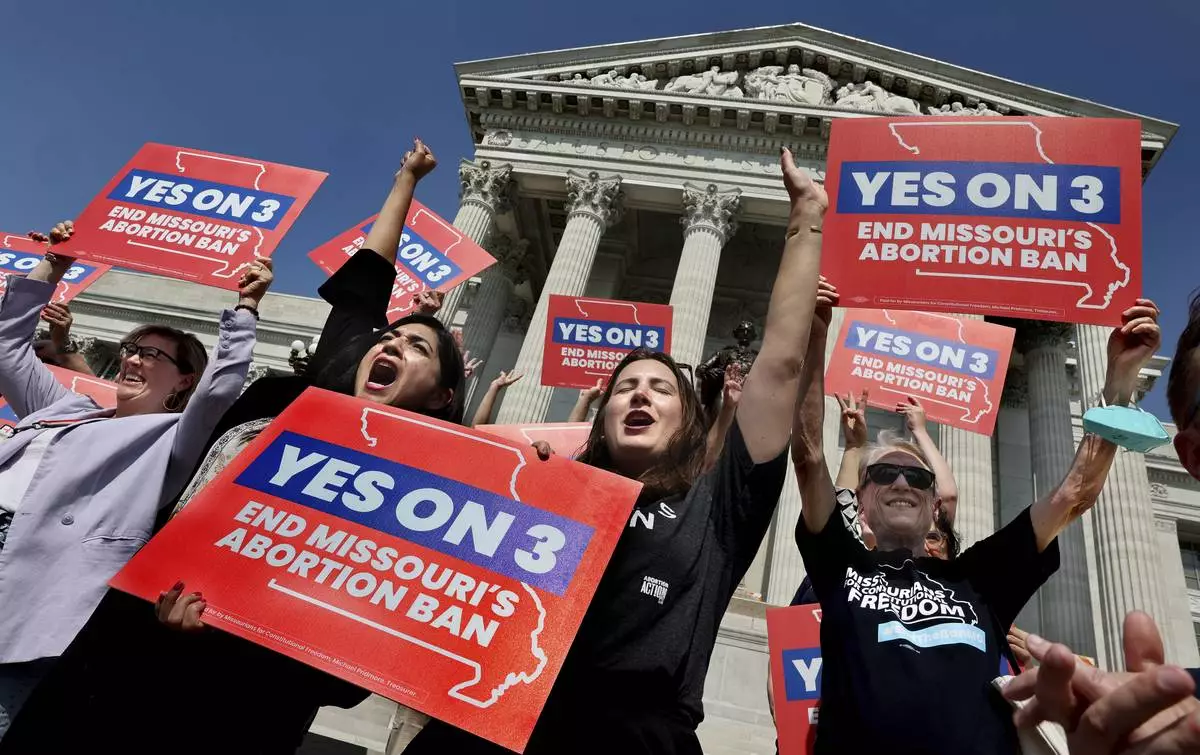
FILE - Amendment 3 supporters Luz Maria Henriquez, second from left, executive director of the ACLU Missouri, celebrates with Mallory Schwarz, center, of Abortion Action Missouri, after the Missouri Supreme Court in Jefferson City, Mo., ruled that the amendment to protect abortion rights would stay on the November ballot, Sept. 10, 2024. (Robert Cohen/St. Louis Post-Dispatch via AP, File)
DUBLIN (AP) — An exit poll in Ireland’s parliamentary election released late Friday suggests the three biggest parties have won roughly equal shares and the country is headed for another coalition government.
A poll released as voting ended at 10 p.m. (2200GMT) said center-right party Fine Gael was the first choice of 21% of voters, with its center-right coalition partner in the outgoing government, Fianna Fail at 19.5%. Left-of-center opposition Sinn Fein was at 21.1% in the poll.
Pollster Ipsos B&A asked 5,018 voters across the country how they had cast their ballots. The survey has a margin of error of plus or minus 1.4 percentage points.
The figures only give an indication and don’t reveal which parties will form the next government. Counting of ballots starts Saturday morning and because Ireland uses a complex system of proportional representation known as the single transferrable vote, it can take between several hours and several days for full results to be known.
The result will show whether Ireland bucks the global trend of incumbents being ousted by disgruntled voters after years of pandemic, international instability and a cost-of-living pressures.
Sinn Fein, which had urged people to vote for change, hailed the result.
“There is every chance that Sinn Fein will emerge from these elections as the largest political party,” Sinn Fein director of elections Matt Carthy told broadcaster RTE.
Though Sinn Fein, which aims to reunite Northern Ireland with the independent Republic of Ireland, could become the largest party in the 174-seat Dail, the lower house of parliament, it may struggle to get enough coalition partners to form a government. Both Fine Gael and Fianna Fail have refused to form alliances with it.
Here’s a look at the parties, the issues and the likely outcome.
The outgoing government was led by the two parties who have dominated Irish politics for the past century: Fine Gael and Fianna Fail. They have similar center-right policies but are longtime rivals with origins on opposing sides of Ireland’s 1920s civil war.
After the 2020 election ended in a virtual dead heat they formed a coalition, agreeing to share Cabinet posts and take turns as taoiseach, or prime minister. Fianna Fail leader Micheál Martin served as premier for the first half of the term and was replaced by Fine Gael’s Leo Varadkar in December 2022. Varadkar unexpectedly stepped down in March, passing the job to current Taoiseach Simon Harris.
Opposition party Sinn Fein achieved a stunning breakthrough in the 2020 election, topping the popular vote, but was shut out of government because Fianna Fail and Fine Gael refused to work with it, citing its leftist policies and historic ties with militant group the Irish Republican Army during three decades of violence in Northern Ireland.
Under Ireland’s system of proportional representation, each of the 43 constituencies elects multiple lawmakers, with voters ranking their preferences. That makes it relatively easy for smaller parties and independent candidates with a strong local following to gain seats.
This election includes a large crop of independent candidates, ranging from local campaigners to far-right activists and reputed crime boss Gerry “the Monk” Hutch.
As in many other countries, the cost of living — especially housing — has dominated the campaign. Ireland has an acute housing shortage, the legacy of failing to build enough new homes during the country’s “Celtic Tiger” boom years and the economic slump that followed the 2008 global financial crisis.
“There was not building during the crisis, and when the crisis receded, offices and hotels were built first,” said John-Mark McCafferty, chief executive of housing and homelessness charity Threshold.
The result is soaring house prices, rising rents and growing homelessness.
After a decade of economic growth, McCafferty said “Ireland has resources” — not least 13 billion euros ($13.6 billion) in back taxes the European Union has ordered Apple to pay it — “but it is trying to address big historic infrastructural deficits.”
Tangled up with the housing issue is immigration, a fairly recent challenge to a country long defined by emigration. Recent arrivals include more than 100,000 Ukrainians displaced by war and thousands of people fleeing poverty and conflict in the Middle East and Africa.
This country of 5.4 million has struggled to house all the asylum-seekers, leading to tent camps and makeshift accommodation centers that have attracted tension and protests. A stabbing attack on children outside a Dublin school a year ago, in which an Algerian man has been charged, sparked the worst rioting Ireland had seen in decades.
Unlike many European countries, Ireland does not have a significant far-right party, but far-right voices on social media seek to drum up hostility to migrants, and anti-immigrant independent candidates are hoping for election in several districts. The issue appears to be hitting support for Sinn Fein, as working-class supporters bristled at its pro-immigration policies.
The exit poll bears out earlier opinion poll findings that voters’ support is split widely among Fine Gael, Fianna Fail, Sinn Fein, several smaller parties and an assortment of independents.
Before polling day, analysts said the most likely outcome is another Fine Gael-Fianna Fail coalition, possibly with a smaller party or a clutch of independents as kingmakers. That remains a likely option.
“It’s just a question of which minor group is going to be the group that supports the government this time,” said Eoin O’Malley, a political scientist at Dublin City University. “Coalition-forming is about putting a hue on what is essentially the same middle-of-the-road government every time.”
Lawless reported from London.
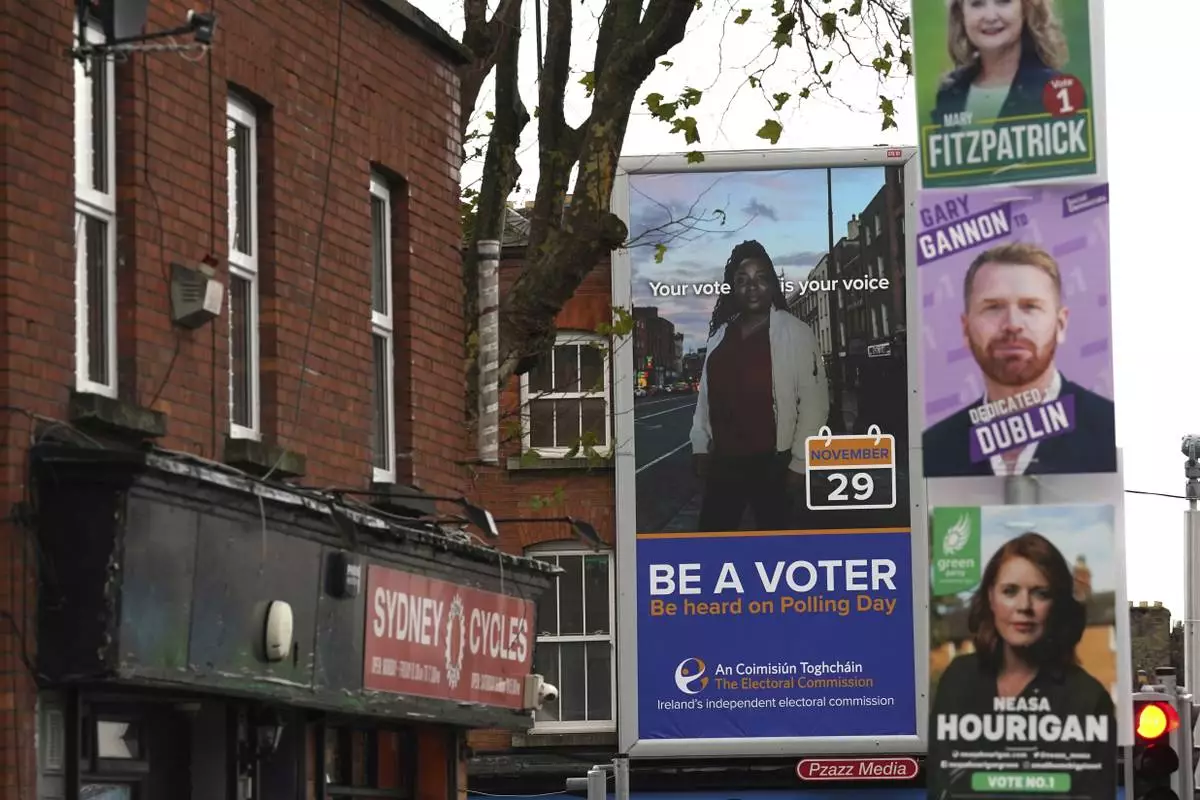
A poster by the Electoral Commission is displayed in Dublin, Friday Nov. 29, 2024, as voters go to the polls in the 2024 General Election in Ireland. (Brian Lawless/PA via AP)
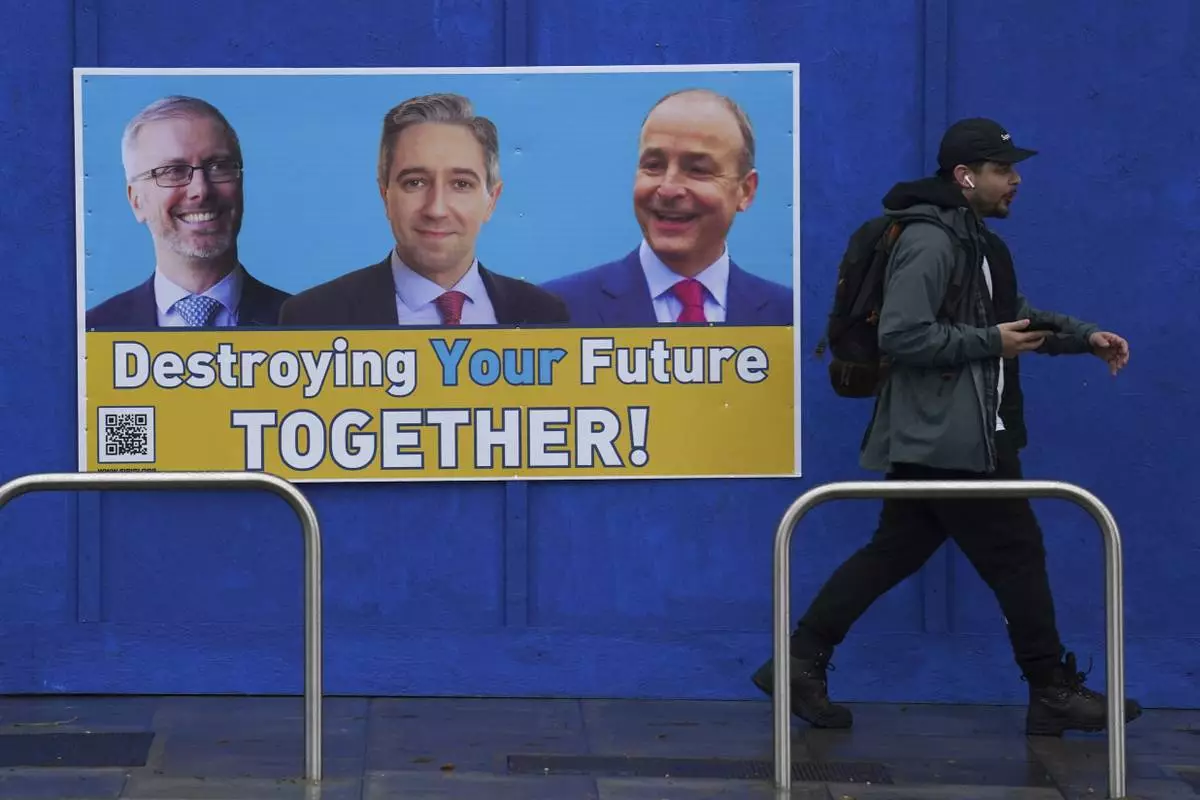
A man walks past a campaign poster in Dublin, Friday Nov. 29, 2024, as voters go to the polls in the 2024 General Election in Ireland. (Brian Lawless/PA via AP)
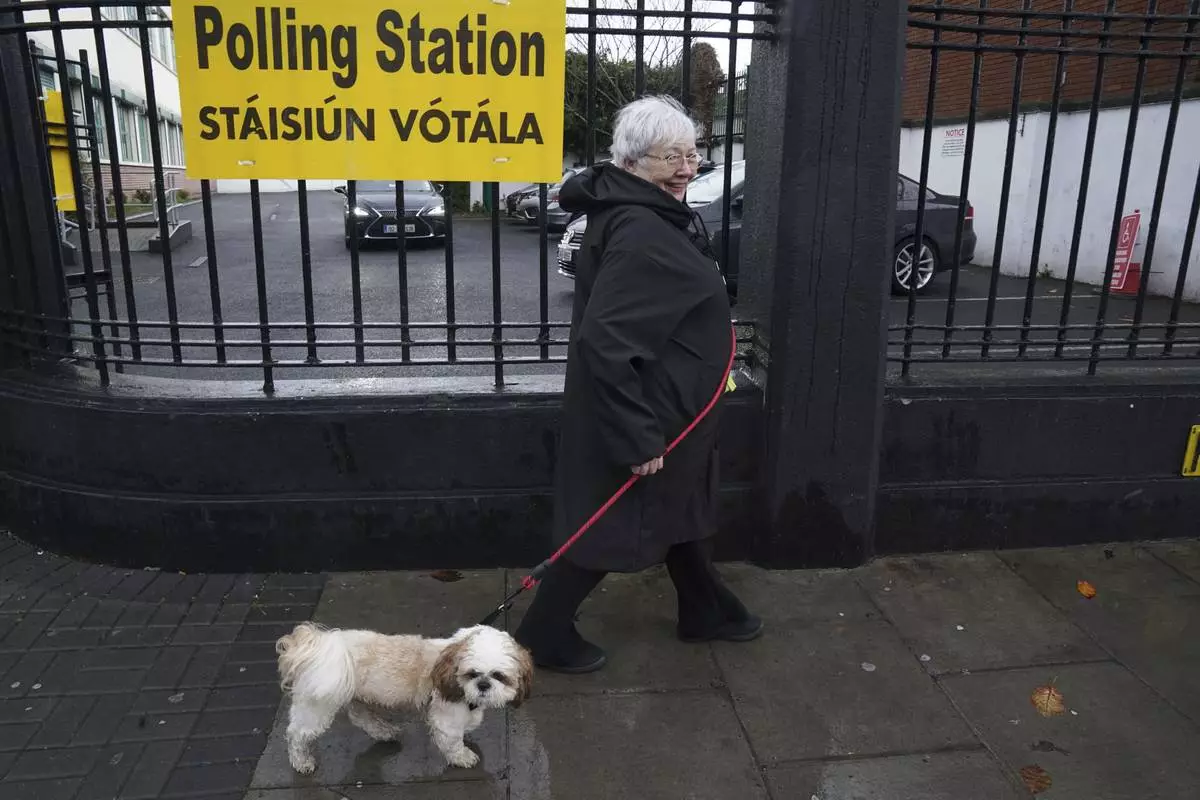
A woman and her dog leaves after voting at the polling station at St Laurence O'Tooles National School in Dublin, Friday Nov. 29, 2024, as voters go to the polls in the 2024 General Election in Ireland. (Brian Lawless/PA via AP)
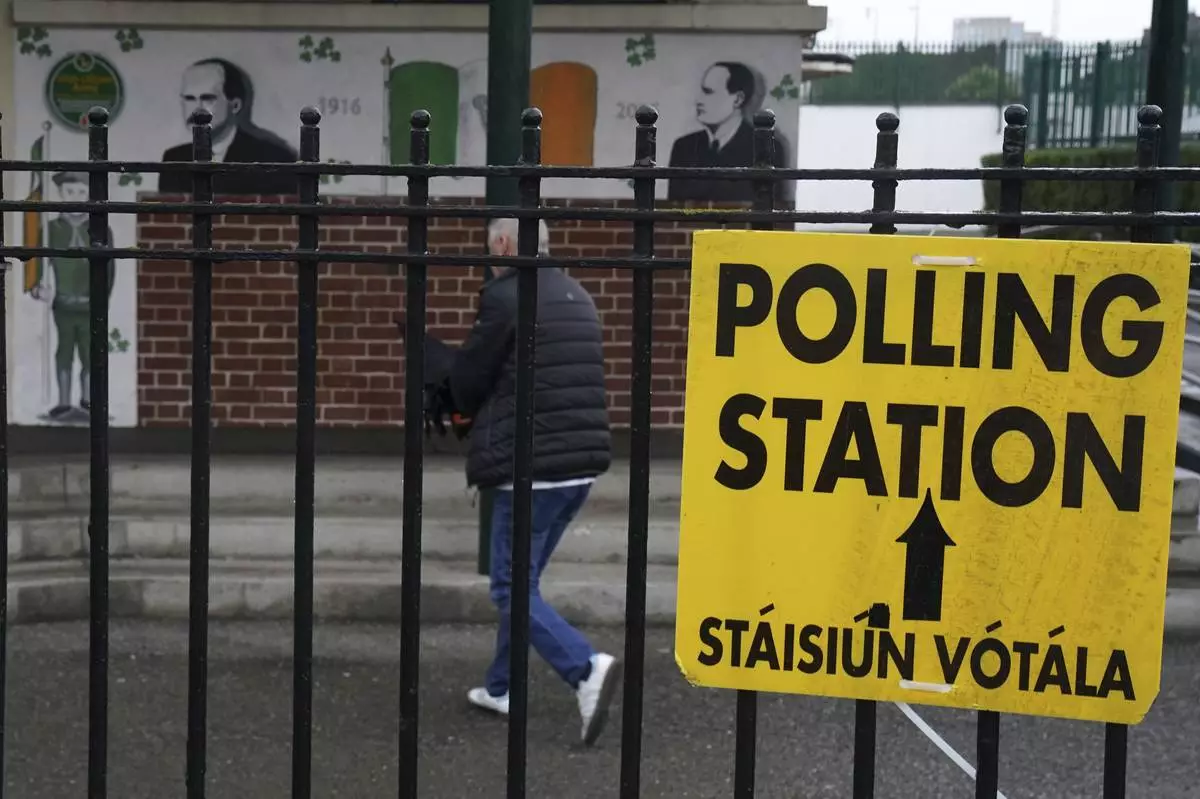
People arrive to cast their votes at the polling station at St Laurence O'Tooles National School in Dublin, Friday Nov. 29, 2024, as voters go to the polls in the 2024 General Election in Ireland. (Brian Lawless/PA via AP)
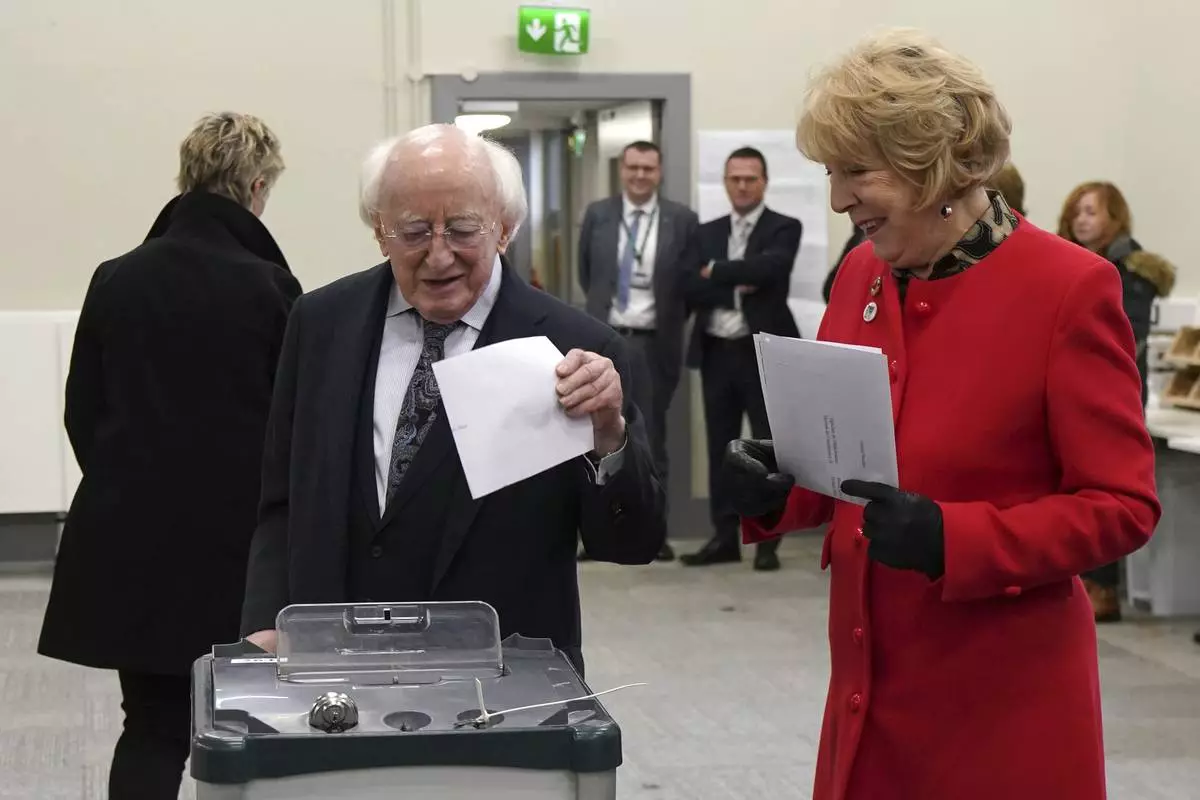
Irish President Michael D Higgins and his wife Sabina cast their votes for the 2024 General Election at St Mary's Hospital, Phoenix Park, Dublin, Friday, Nov. 29, 2024.(Brian Lawless/PA via AP)
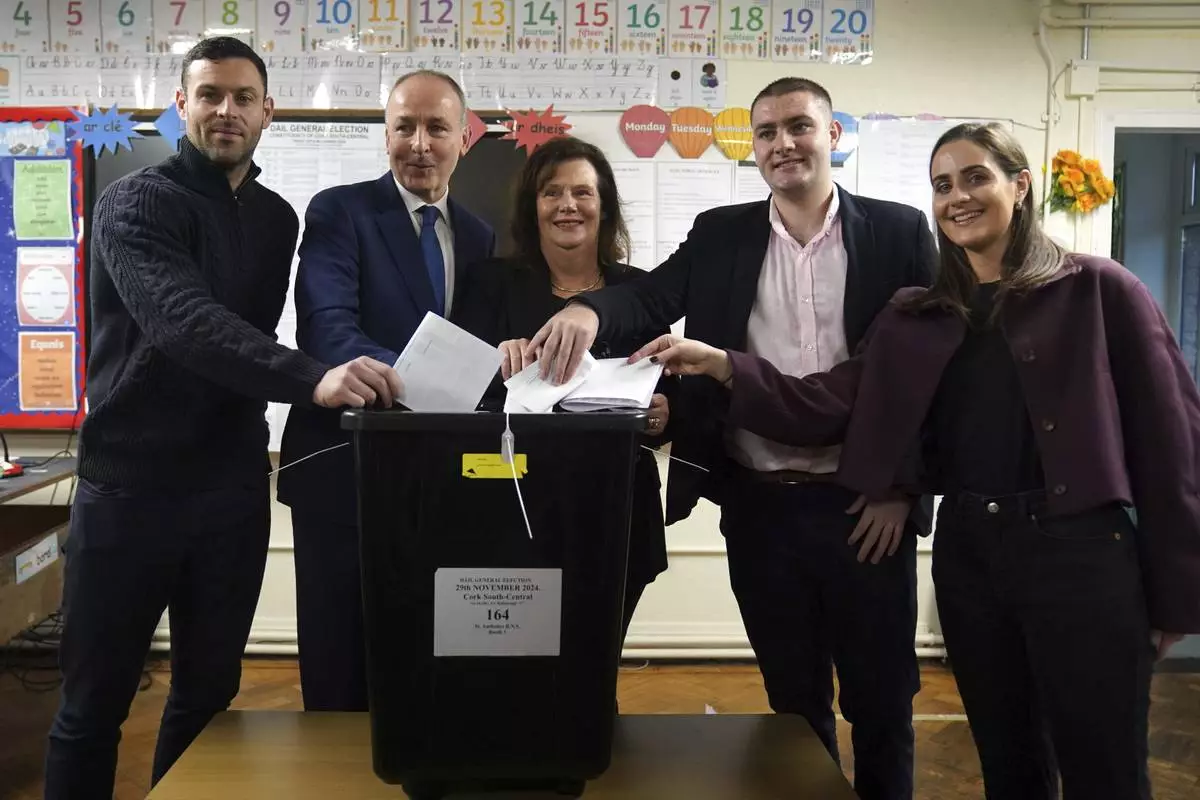
Minister for Foreign Affairs, and Minister for Defence and Fianna Fail leader Micheal Martin, second left, accompanied by his wife Mary O'Shea, third from right, and his sons Micheal Aodh Martin, left, Ruairi Martin, second from right, and daughter Leana Martin, arrives to casts his vote at St Anthony's Boys' School, Beechwood Park, Ballinlough, Cork, as voters go to the polls for the 2024 General Election in Ireland, Friday, Nov. 29, 2024. (Jacob King/PA via AP)
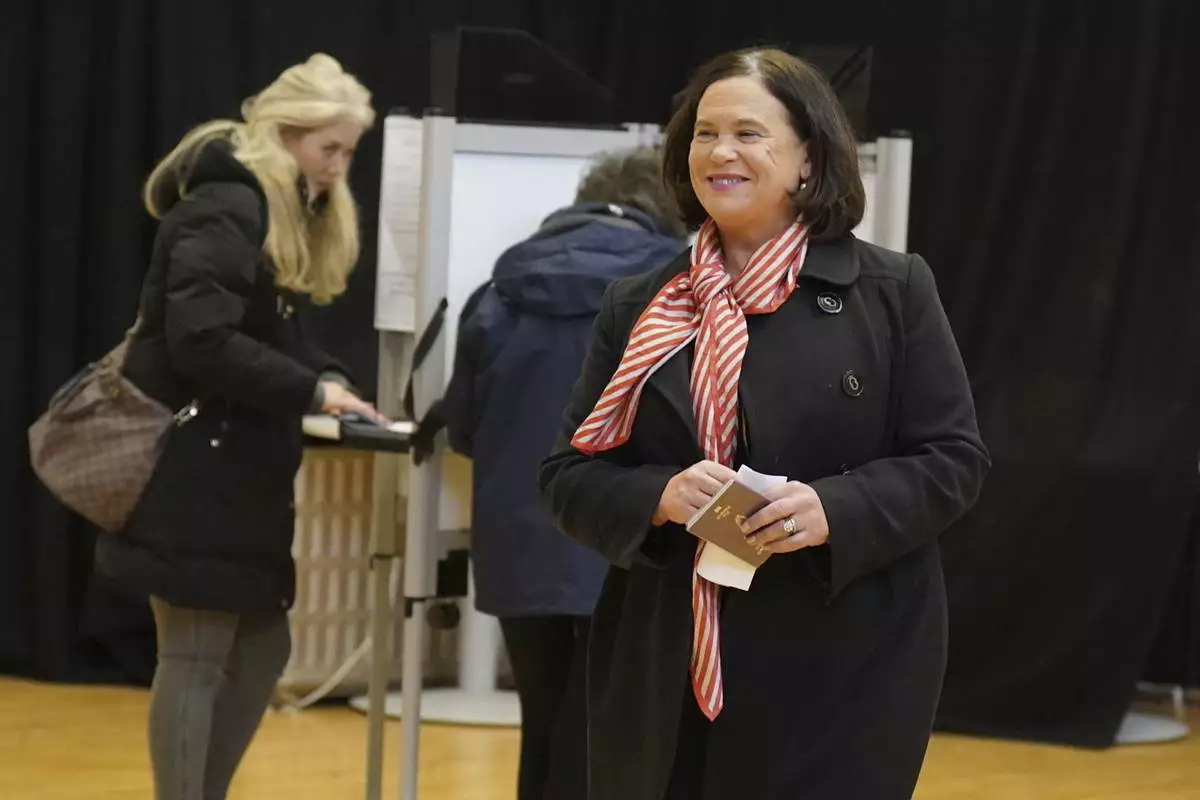
Sinn Fein leader Mary Lou McDonald walks to cast her vote at Deaf Village Ireland (DVI) on the Navan Road, in Dublin, as voters go to the polls in the 2024 General Election in Ireland, Friday Nov. 29, 2024. (Niall Carson/PA via AP)
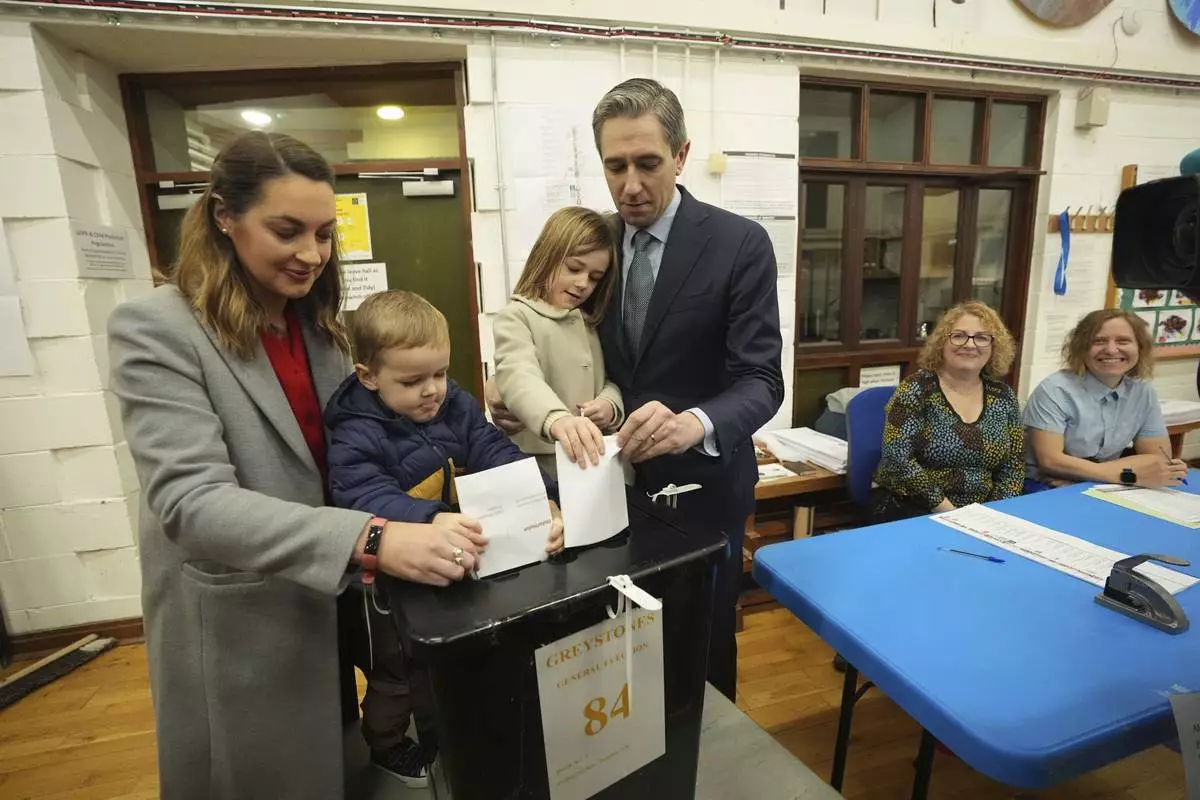
Irish Prime Minister and Fine Gael leader Simon Harris, center, accompanied by his wife Caoimhe and children Cillian and Saoirse, casts his vote at Delgany National School, County Wicklow, as voters go to the polls for the 2024 General Election in Ireland, Friday Nov. 29, 2024. (Niall Carson/PA via AP)
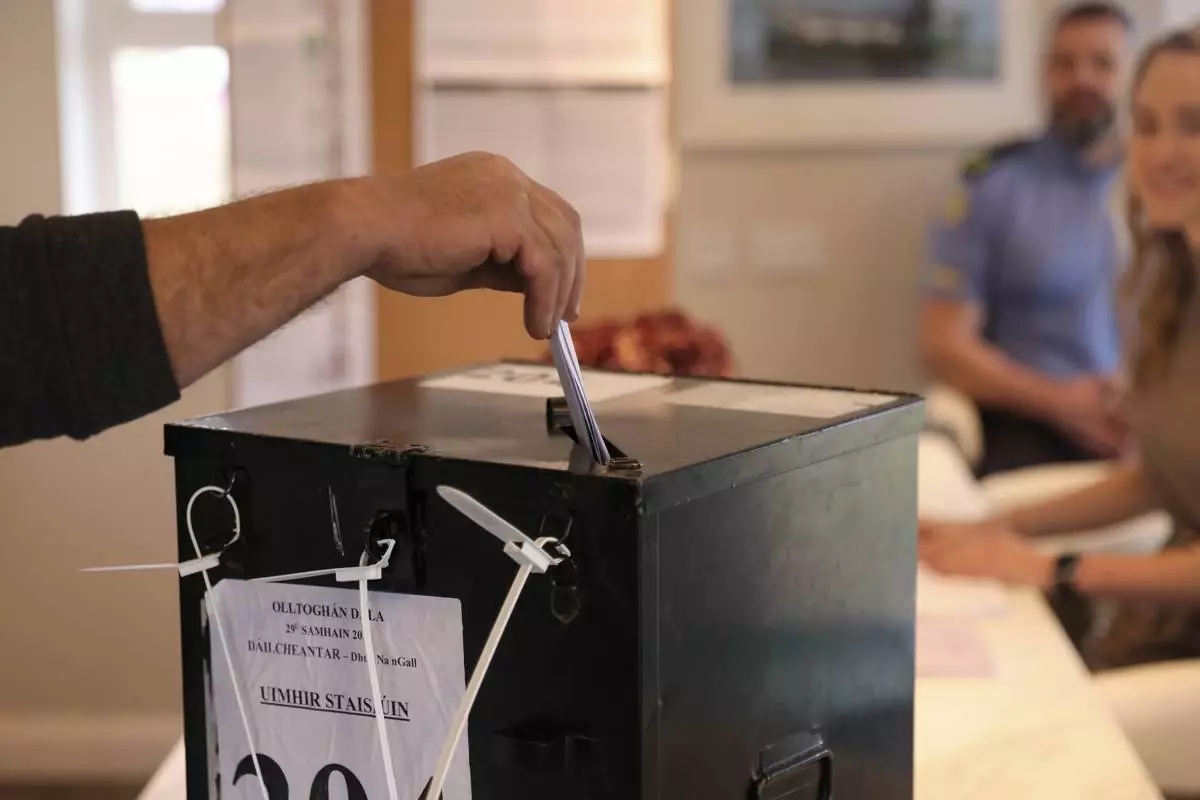
A man casts his vote in a ballot box on the Island of Gola as voters go to polls the for the 2024 General Election in Ireland, Friday, Nov. 29, 2024. (AP Photo/Peter Morrison)
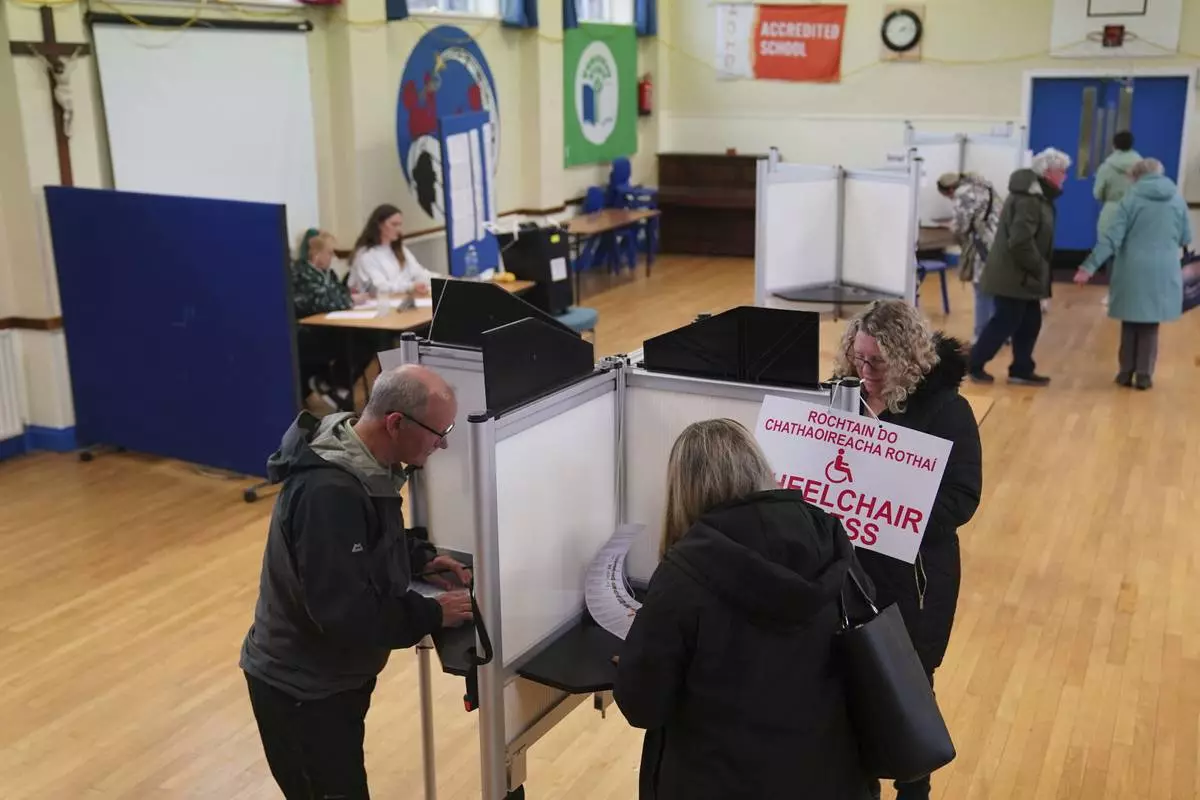
People cast their votes at Greenmount National School in Cork, as voters go to polls the for the 2024 General Election in Ireland, Friday, Nov. 29, 2024. (Jacob King/PA via AP)
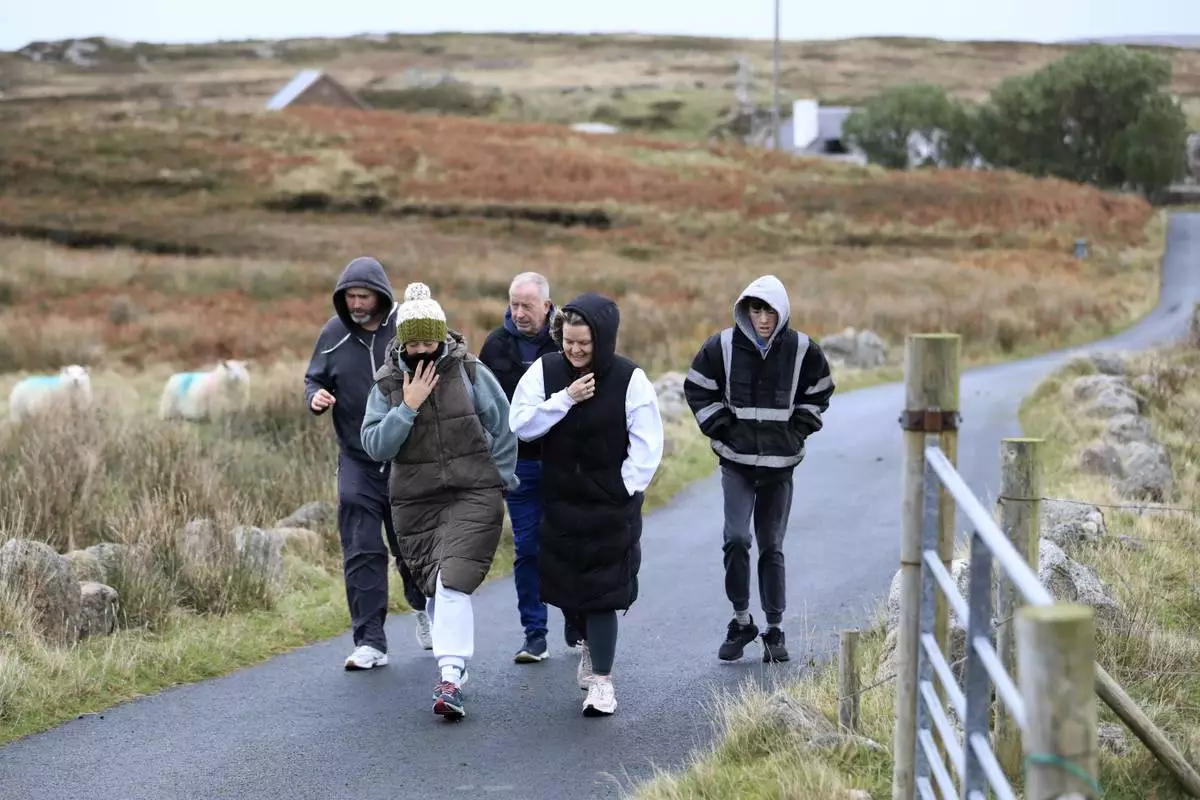
Island residents walk to a polling station on the Island of Gola as voters go to polls the for the 2024 General Election in Ireland, Friday, Nov. 29, 2024. (AP Photo/Peter Morrison)
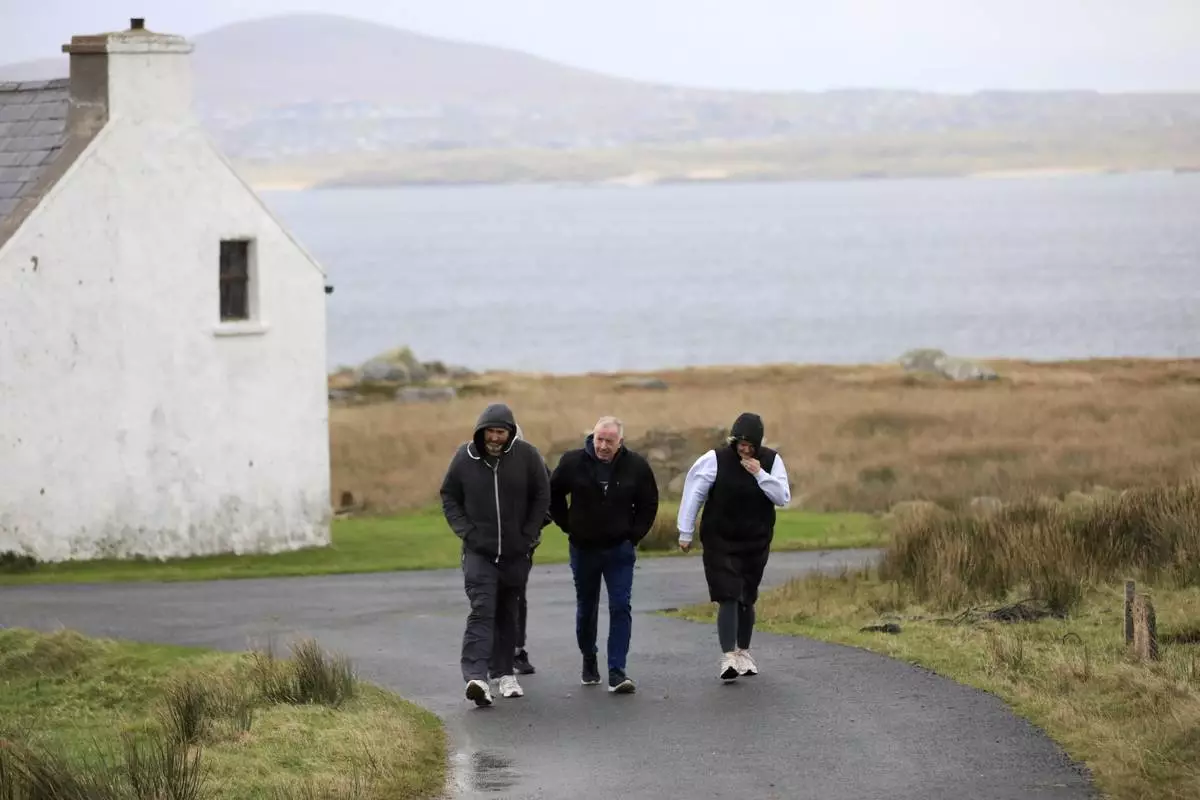
Island residents walk to a polling station on the Island of Gola as voters go to polls the for the 2024 General Election in Ireland, Friday, Nov. 29, 2024. (AP Photo/Peter Morrison)
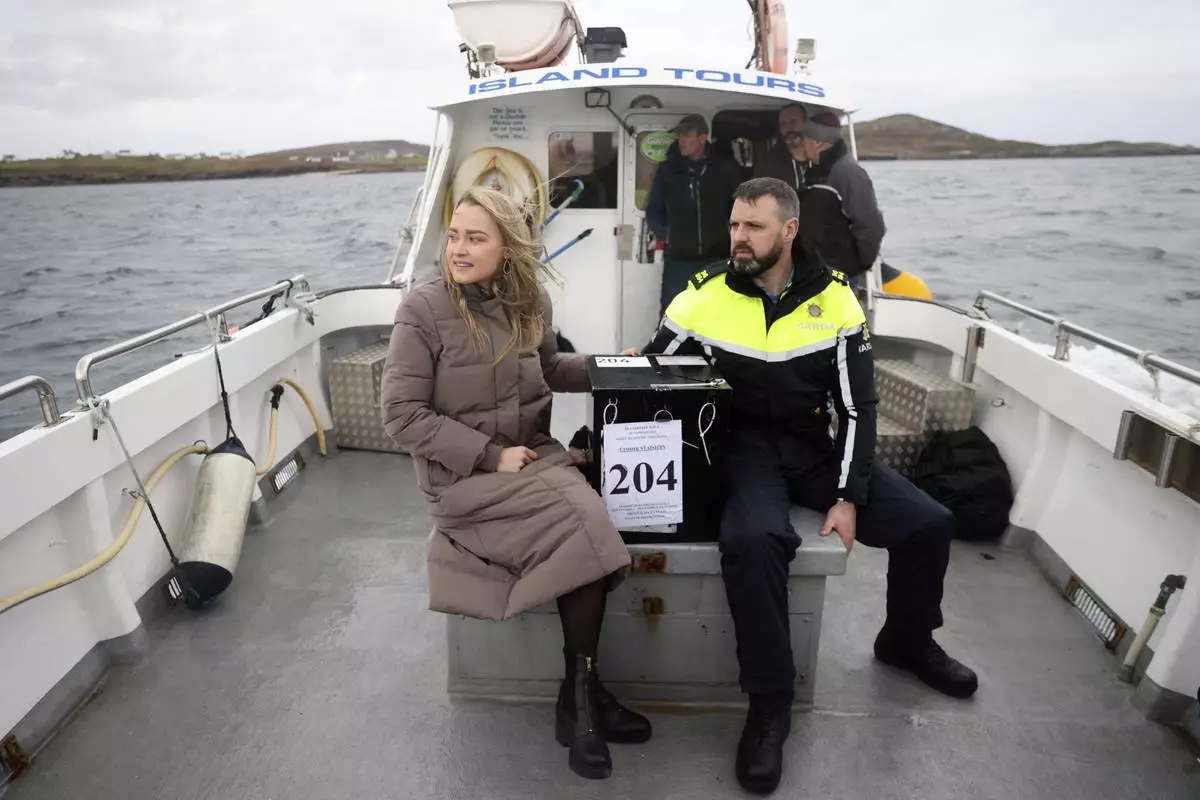
Presiding officer Caroline Sharkey and Garda Ronan Steede look after a ballot box that is taken by boat to the Island of Gola as voters go to polls the for the 2024 General Election in Ireland, Friday, Nov. 29, 2024. (AP Photo/Peter Morrison)
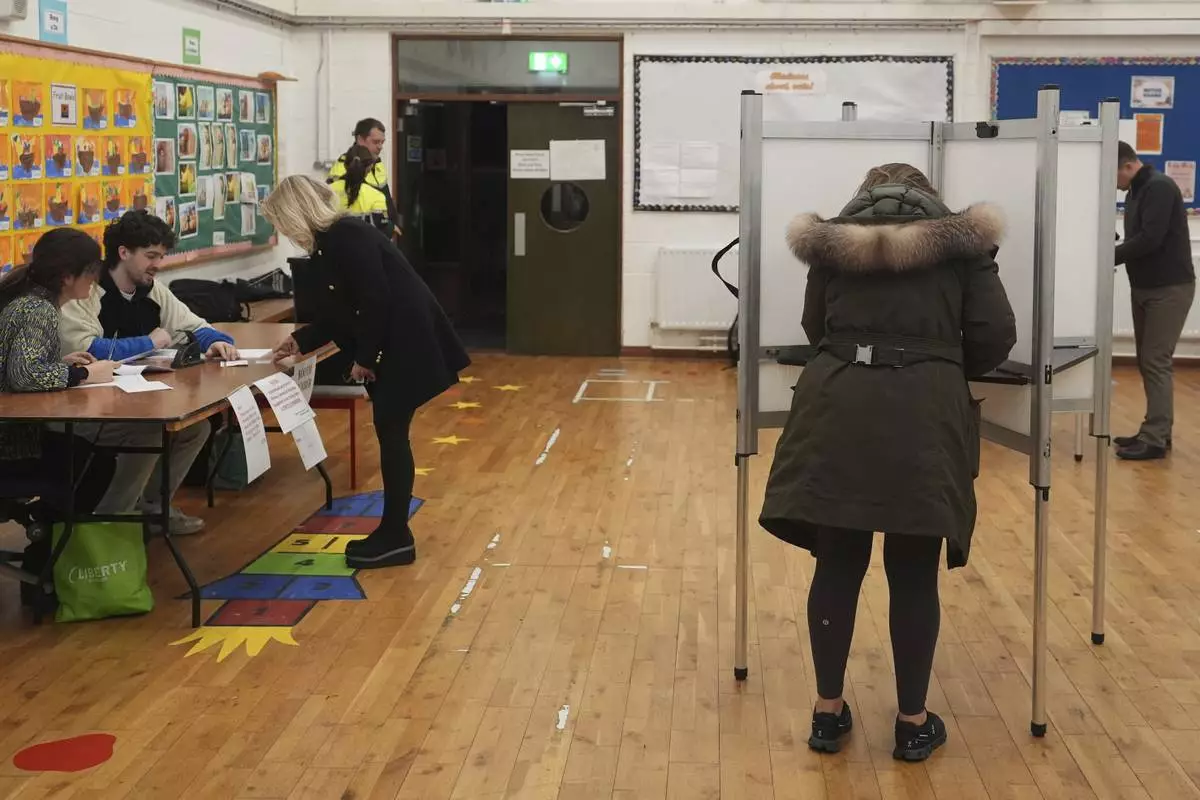
Voters cast their ballots at Delgany National School, County Wicklow, as voters go to the polls for the 2024 General Election in Ireland, Friday Nov. 29, 2024. (Niall Carson/PA via AP)
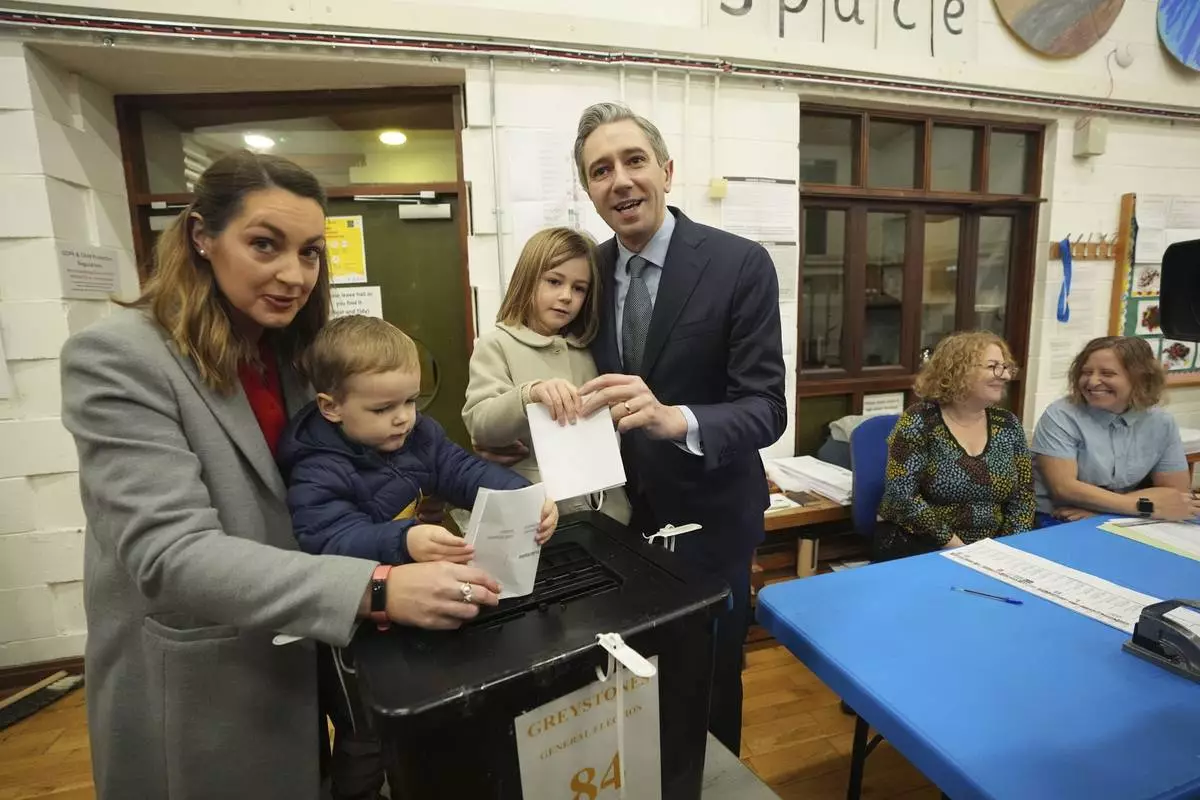
Irish Prime Minister and Fine Gael leader Simon Harris, center, accompanied by his wife Caoimhe and children Cillian and Saoirse, casts his vote at Delgany National School, County Wicklow, as voters go to the polls for the 2024 General Election in Ireland, Friday Nov. 29, 2024. (Niall Carson/PA via AP)
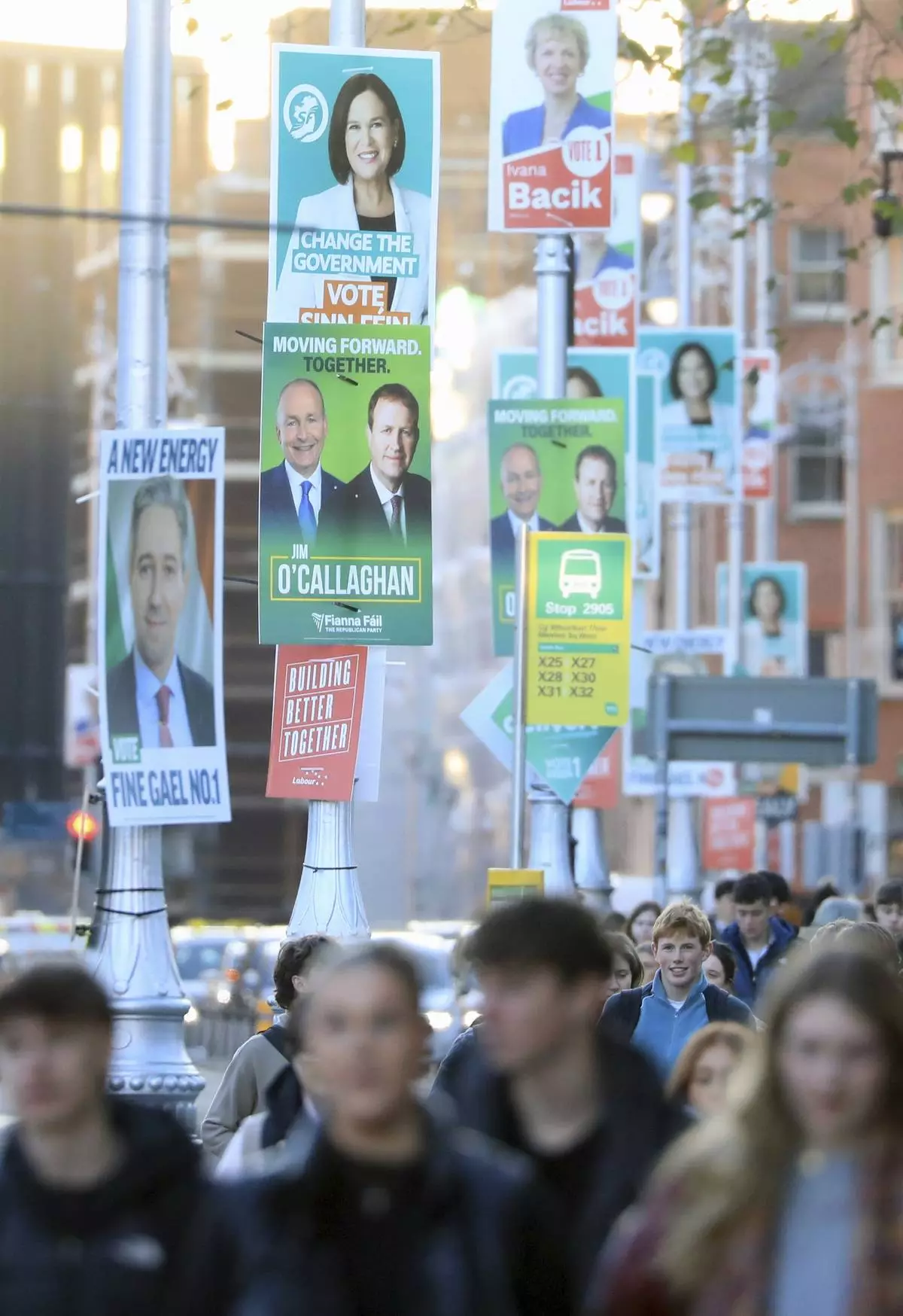
Irish election posters hang from lamp posts in Dublin City centre, Tuesday, Nov. 26, 2024, ahead of Ireland's election on Friday. (AP Photo/Peter Morrison)
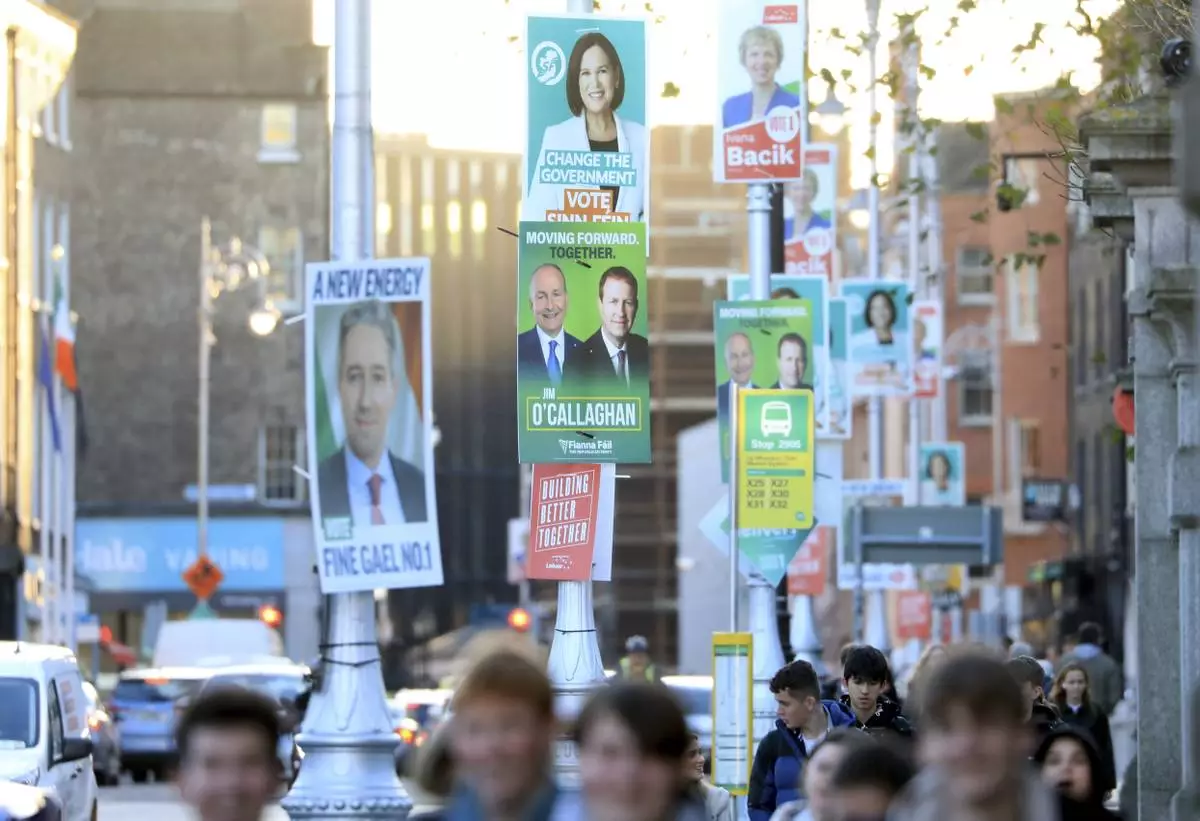
Irish election posters hang from lampposts in Dublin City centre, Tuesday, Nov. 26, 2024, ahead of Ireland's election on Friday. (AP Photo/Peter Morrison)
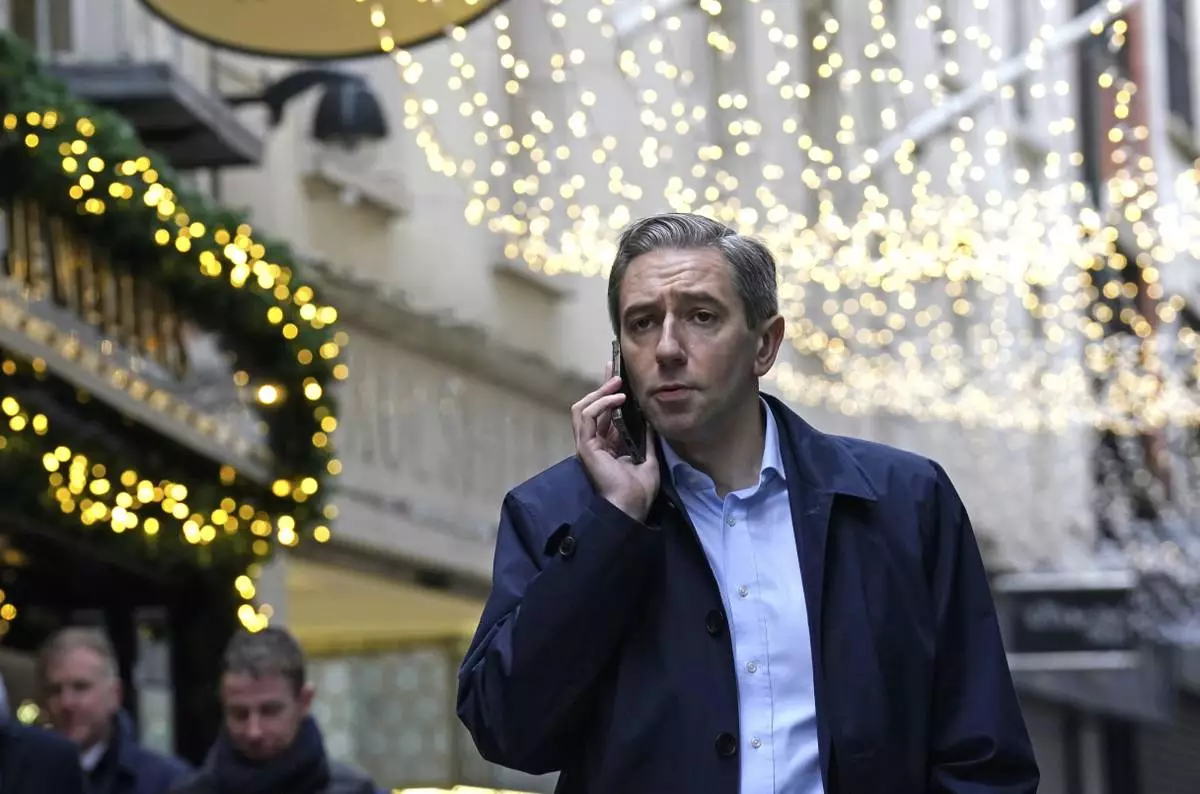
Irish Prime Minister and Fine Gael leader Simon Harris, center, speaks on the phone during a walkabout on the last day of campaigning, on the eve of the General Election, in Dublin, Thursday, Nov. 28, 2024. (Brian Lawless/PA via AP)
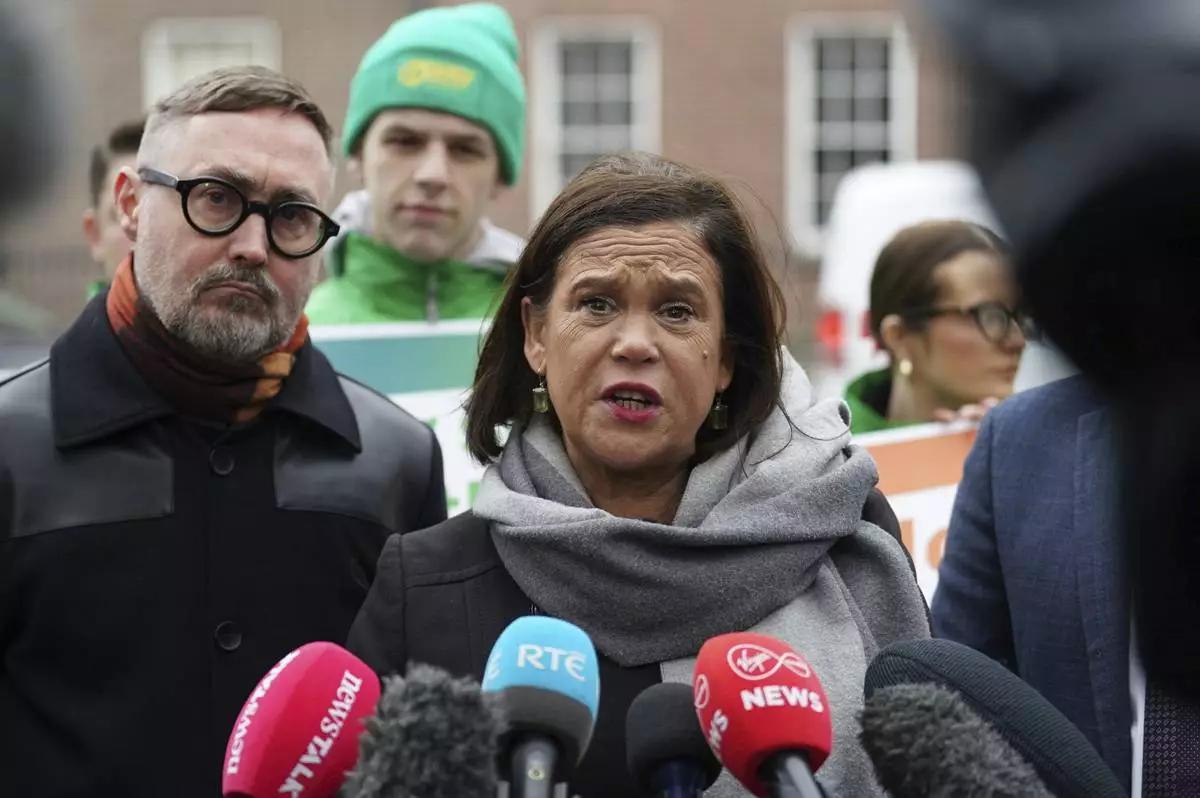
Sinn Fein leader Mary Lou McDonald, center, speaks to the media outside Government Buildings, on the last day of campaigning on the eve of the General Election, in Dublin, Thursday, Nov. 28, 2024. (Brian Lawless/PA via AP)
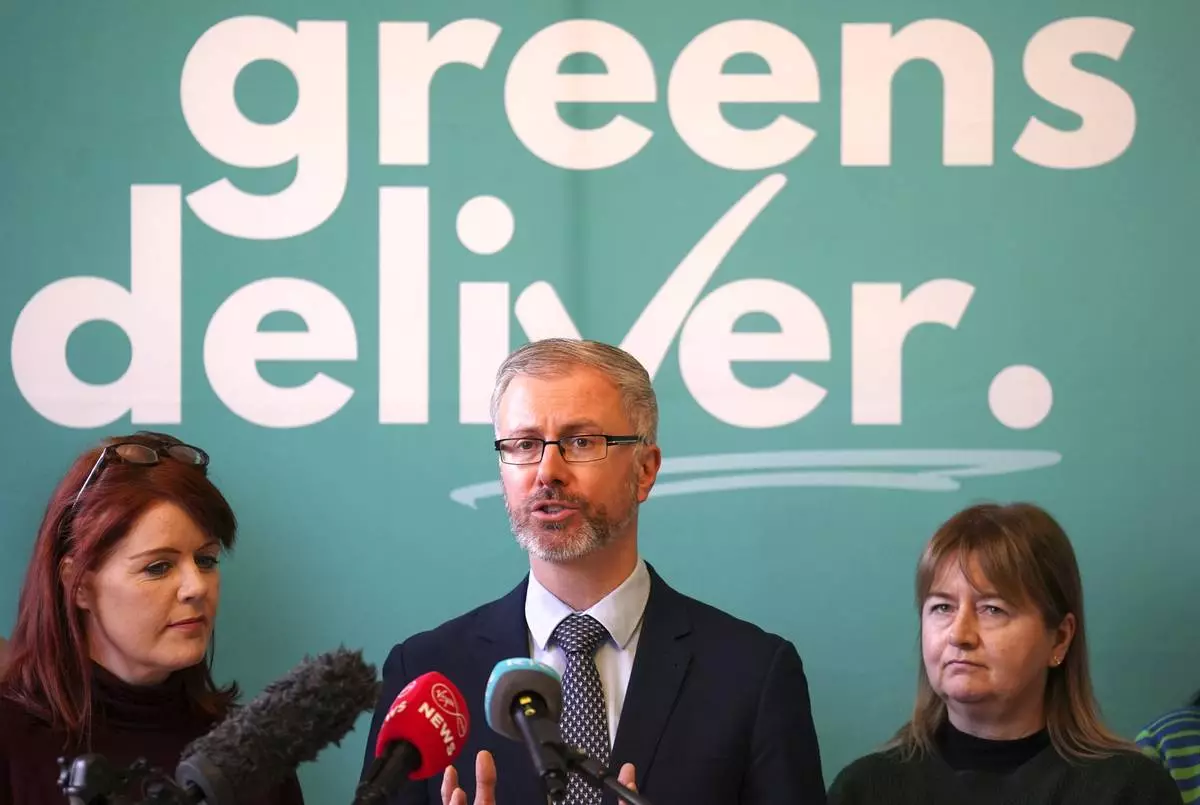
Green leader Roderic O'Gorman, center, speaks to the media during a press conference at the Irish Architectural Archive, on the last day of campaigning on the eve of the General Election, in Dublin, Thursday, Nov. 28, 2024. (Brian Lawless/PA via AP)
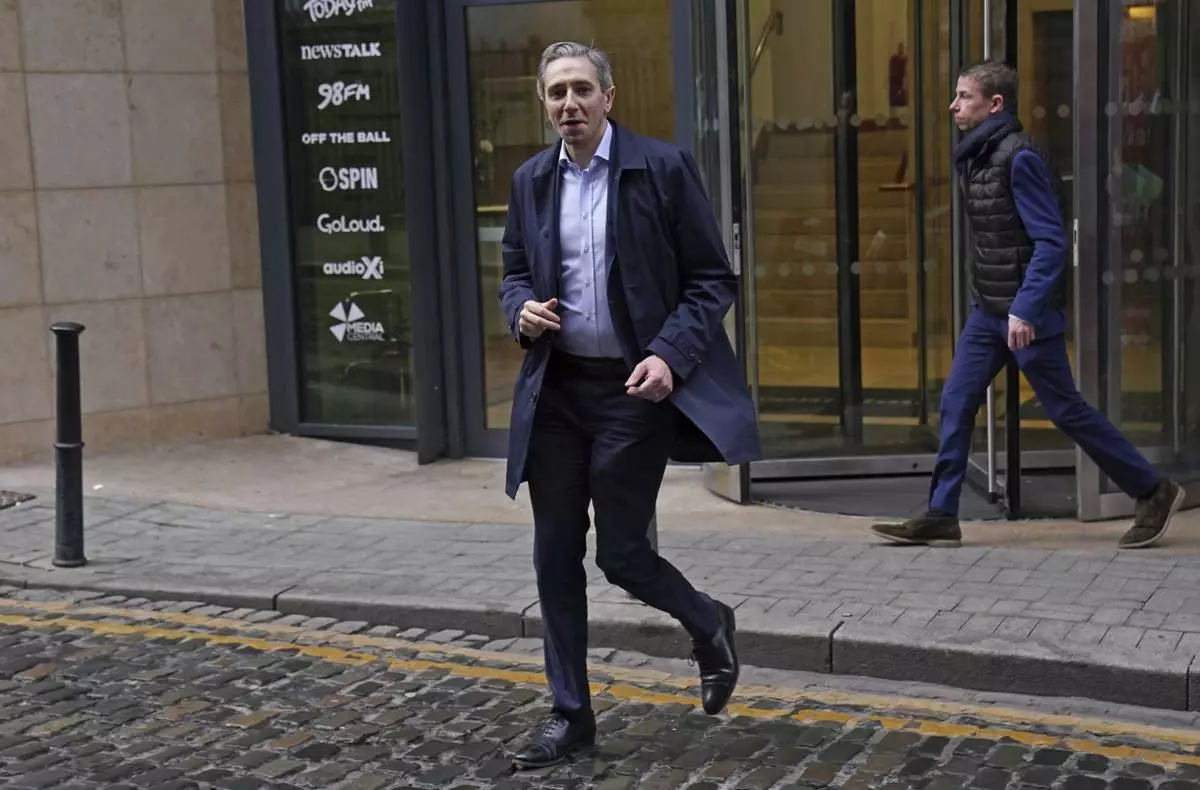
Irish Prime Minister and Fine Gael leader Simon Harris leaves Marconi House after speaking on Newstalk's Pat Kenny show, on the last day of campaigning on the eve of the General Election, in Dublin, Thursday, Nov. 28, 2024. (Brian Lawless/PA via AP)
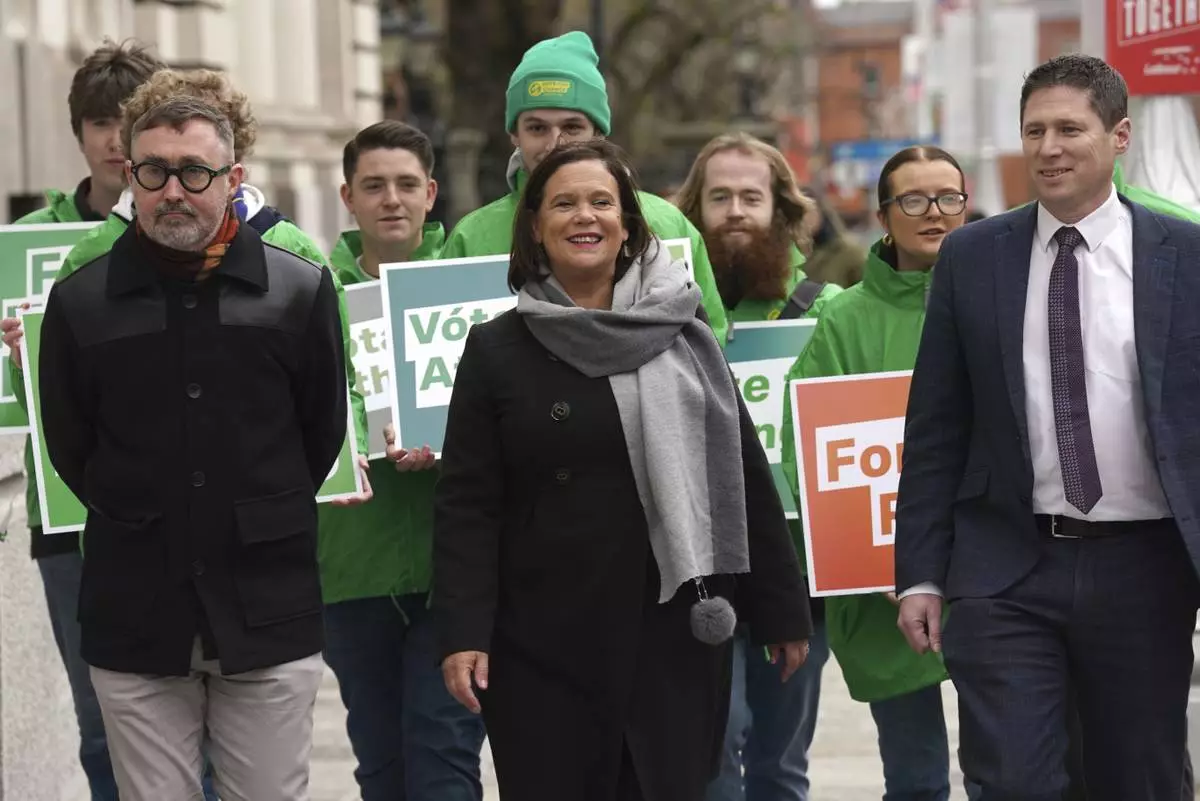
Sinn Fein leader Mary Lou McDonald, center, walks with candidates Eoin O Broin, left, Matt Carthy, right, and supporters arrive at Government Buildings, on the last day of campaigning on the eve of the General Election, in Dublin, Thursday, Nov. 28, 2024. (Brian Lawless/PA via AP)
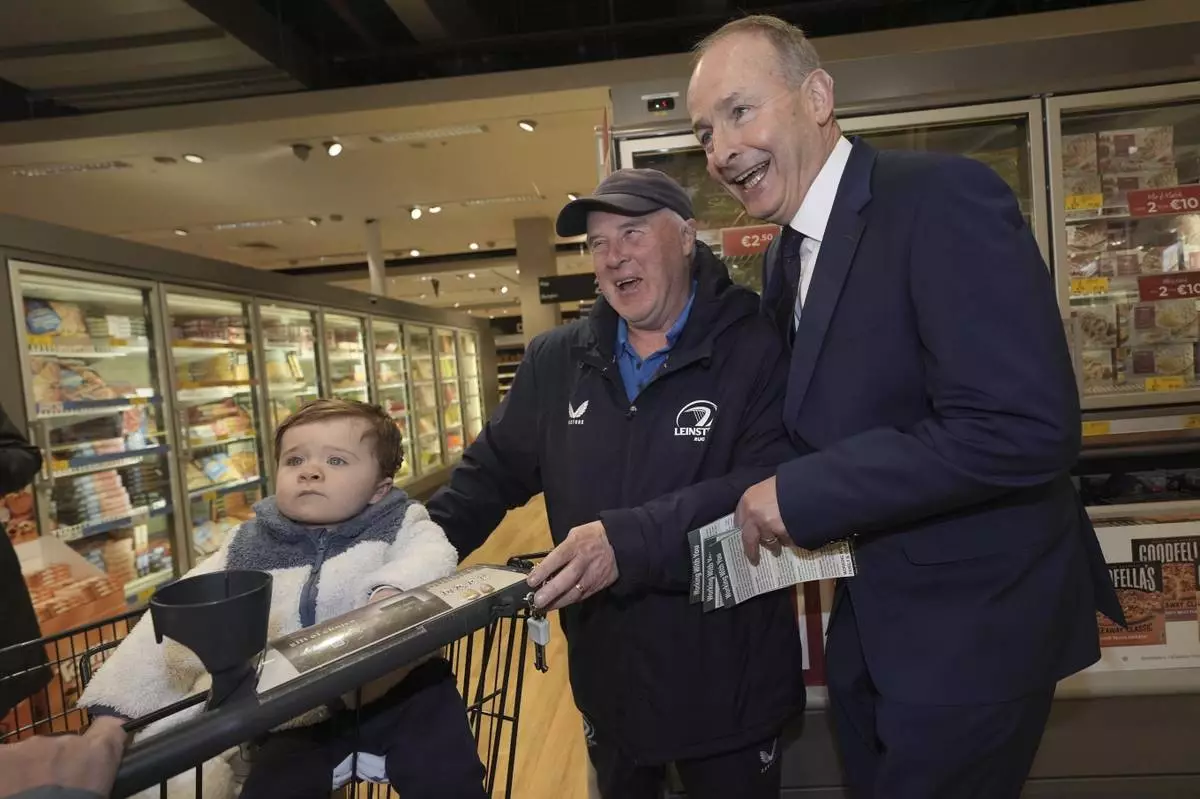
Tanaiste and Fianna Fail leader Micheal Martin, right, meets Barney Hynes and his grandson Wyatt McLoughlin in Arklow, Ireland, on the last day of campaigning on the eve of the General Election, Thursday Nov. 28, 2024. (Brian Lawless/PA via AP)





